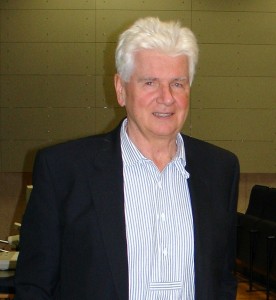 Günter Blobel, M.D., Ph.D., who received the 1999 Nobel Prize in Physiology or Medicine for his discovery that proteins have built-in signals that direct their movement in cells, visited the Joan C. Edwards School of Medicine at Marshall University and met with faculty, staff and students.
Günter Blobel, M.D., Ph.D., who received the 1999 Nobel Prize in Physiology or Medicine for his discovery that proteins have built-in signals that direct their movement in cells, visited the Joan C. Edwards School of Medicine at Marshall University and met with faculty, staff and students.
Marshall President Stephen J. Kopp presented Blobel with an honorary doctoral degree in science from the school.
For decades, Blobel, a cellular and molecular biologist, has studied the protein distribution system within cells. His studies showed that the movement and position of proteins within a cell depend on specific signals which direct them to proper cell destinations. Ultimately, the protein-signaling mechanisms discovered by Blobel were discovered to be universal, found in yeast, plant, animal and human cells.
His work has shed light on diseases such as cystic fibrosis and kidney stones, which have been linked to errors in the signal and transport systems.
In awarding Blobel with an honorary degree, President Kopp praised the researcher for his life-long curiosity and commitment to the life sciences.
“Dr. Blobel is the epitome of a great research scientist and humanitarian, one who has dedicated his entire career to unlocking the mysteries of human disease and benefiting humankind,” Kopp said. “He is among the most respected researchers in the world and it is with pleasure and great pride that we bestow upon him our highest honor, this honorary doctoral degree.”
Dr. Joseph I. Shapiro, dean of the School of Medicine, said Blobel’s visit serves to both ignite passion and encourage young researchers to pursue their scientific goals.
“It is inspiring for us to meet with a scientist like Dr. Blobel, someone who has truly reached a scientific pinnacle,” he said. “I am absolutely delighted that he has found the time in his busy schedule to visit us at Marshall, and I am grateful to Dr. Nader Abraham, our new vice-dean for research, for arranging this incredible visit.”
Blobel, who has received many distinguished awards during his career, said he is pleased to receive the honorary degree from Marshall.
“I am humbled and totally surprised to receive this honorary degree from Marshall University,” he said. “Marshall is a distinguished university and I am so pleased receive this honor.”
Blobel’s research continues as he now works to understand the signals between a cell’s nucleus and cytoplasm. Experts say the keys to unlocking these type communications will eventually help explain how diseases like cancer occur.
Blobel received his M.D. from the University of Tübingen in 1960 and his Ph.D. in 1967 from the University of Wisconsin, Madison, where he worked with Van R. Potter in the McArdle Laboratory for Cancer Research. He did postdoctoral work at The Rockefeller University in the laboratory of George E. Palade and has been at the university since. Blobel was named the John D. Rockefeller Jr. Professor in 1992 and also serves as an investigator at the Howard Hughes Medical Institute.
Born in a small town in eastern Germany (now Poland) in 1936, Blobel and his family fled the country during World War II. On their way to the west, they passed through the city of Dresden, which only days later was destroyed in an air bombing. Blobel’s oldest sister was killed some weeks later in an air attack on a train in which she was traveling.
In memory of his sister and in an effort to help rebuild the city of Dresden, Blobel founded Friends of Dresden, Inc., a charitable organization, with the goal to raise funds in the United States to help rebuild the many beautiful structures in Dresden that were destroyed in World War II.








